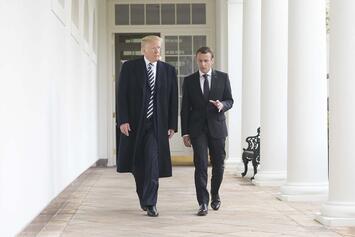
European elites are greeting the incoming Trump administration with something less than enthusiasm. The UK has sent an ambassador to Washington with a well-expressed disdain for the returning US president. Le Monde, a French publication not known for its pro-American sympathies, called Trump’s election ‘the nail in [the] coffin’ for the US as a ‘democratic model’ for the world. The Guardian, predictably, has called for Europeans to fight to preserve the continent’s welfare and climate regime.
Some seem to think that Trump’s return is the spur Europe needs to finally stand on its own two feet. But they need to recognise, as was the case during the Second World War and the Cold War, that only a strong alliance between Europe and the US offers any hope of resisting the rise of an authoritarian bloc, this time grouped around China.
There are hopeful signs. Since the start of the Ukraine conflict, ties between Europe, Canada and the US have been strengthened. There is some promise in an incipient alliance between North America and India, Japan and Australia. But Europe cannot expect the US to bear the strategic burden itself.
Trump’s insistence that Europe rearm makes sense at a time when the continent is facing immediate threats, most immediately in the Red Sea and Ukraine. Today, almost all European countries outside the UK, Greece and the Baltic states do not spend more than two per cent of their GDP on defence, while the US spends roughly 3.5 per cent.
Although there is an isolationist tendency among MAGA activists, most US voters are in favour of expanding America’s ‘global presence’. In a reinvigorated alliance, Europe has much to offer in terms of production and expertise, particularly given the sad state of the US military industry, as evidenced by shortages of materials to send to allies like Ukraine, Taiwan or Israel.
A similar imperative exists in the economic sphere. Europeans have long prided themselves on producing a stronger, more equitable economy than the military-oriented Americans. Two decades ago, one could legitimately see Europe as a determinative third force in the world economy. This is no longer the case. It’s basically a choice between China and the US.
Read the rest of this piece at Spiked.
Joel Kotkin is the author of The Coming of Neo-Feudalism: A Warning to the Global Middle Class. He is the Roger Hobbs Presidential Fellow in Urban Futures at Chapman University and and directs the Center for Demographics and Policy there. He is Senior Research Fellow at the Civitas Institute at the University of Texas in Austin. Learn more at joelkotkin.com and follow him on Twitter @joelkotkin.
Photo: Whitehouse Archives, Official White House Photo by Shealah Craighead, via Flickr, Government work, Public Domain.












